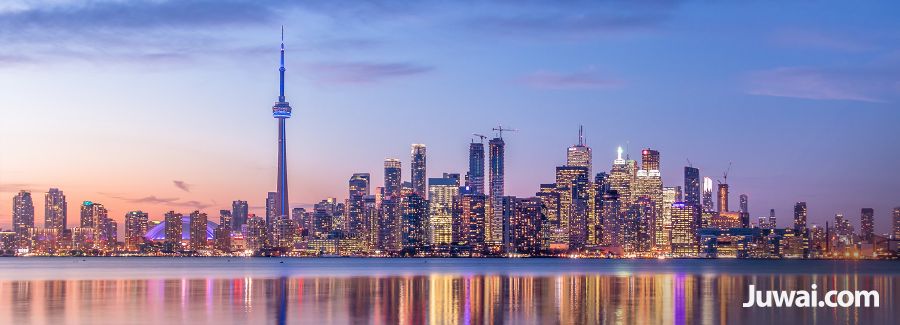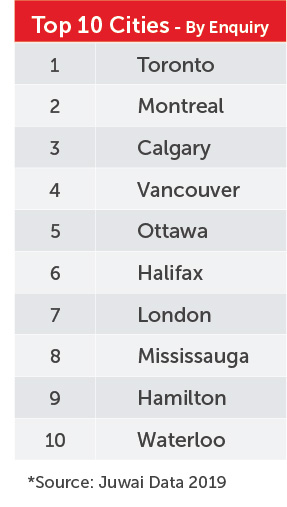Asia News
- Home
- News
- Asia News
You've successfully copied this link.
New hotspots now compete with Vancouver and Toronto for Chinese investment

Foreign buyer taxes in Toronto and Vancouver have shifted some Chinese to Calgary and Montréal.
Canada has been a destination for Chinese investors for many years, and that includes real estate. Until 2017, Canada sat behind only the United States and Australia, ahead of the Brexit-wracked United Kingdom, as the destination of choice for Chinese investors purchasing overseas property.
A favourable currency and lifestyle, strong educational institutions, some of the world’s cleanest natural environments, and a progressive, multi-cultural society have pushed it up the list. The only nation investing more into Canada is its traditional trading partner, the U.S.
Vancouver, the gateway that is closest geographically to Asia, and Toronto, the country’s economic center, remain the most popular investment destinations in real numbers.
However, in 2016 and 2017, when both cities implemented foreign buyer taxes on all overseas investors (20% in Vancouver and the surrounding area, 15% in the Toronto region) as way to bring prices under control, both experienced an immediate, negative impact on sales transactions.
British Columbia and Ontario are re-emerging
The negative impact proved temporary, and enquiries and sales by Chinese buyers in British Columbia and Ontario are once again on the rise. The ongoing trade dispute could put Chinese buyers off the US markets (currently 15% of all property sales according to the American National Association of Realtors) and send them to locations like Canada, despite its extra duties.
Global consultancy Knight Frank’s 2019 Wealth Report estimated China in Hong Kong together have nearly 13,000, ultra-high net worth individuals (those with liquid asset totaling over US$30 million) and many were still seeking overseas assets.
“Chinese buyers are still looking at familiar global markets which offer language advantages and immigration possibilities, as well as remaining outside any trade disputes. The worsening trade relationship between China and the U.S. may cause Chinese investors to shift their presence into other key markets,” said Knight Frank.
Sales of U.S. property to Chinese buyers has already fallen 4%. As BC and Ontario wrestle with extra duties, rent controls, and disclosure rules, Chinese investors are seeking alternatives. They have diverted their attention to other Canadian cities, especially Montréal, Québec and Calgary, Alberta.
Montréal
Montréal, often referred to as Canada’s cultural capital, is experiencing an economic renaissance, led by the technology industries. Multinationals such as IBM, Facebook and Amazon are opening offices in the bilingual city, and firms like Thales SA are leading the burgeoning AI research sector.
The result was a 10% increase in home sales in 2018. Juwai research noted end-user enquires into Montréal rose 17.3% last year. “Foreign demand is getting stronger and stronger. The Asia market has now taken a space it didn’t have just two years ago,” Engel & Völkers Montréal owner Debby Doktorczyk told National Mortgage News in 2018.
A factor in the renewed interest could be Montréal’s relatively low home prices. The median average is CA$317,000 (compared to CA$870,000 in Toronto and CA$1.4 million in Vancouver). The luxury sector expanding and the city’s limited land supply — the downtown core is an island — is expected to support future gains.
The Canada Mortgage & Housing Corporation’s most recent data estimated house prices rose 7% in 2017, and condominiums 3%, with both on an upward trajectory.
Additionally, Québec has no supplementary foreign buyer taxes. Taken with direct flights from Beijing and Shanghai and one of its five universities in Canada’s Ivy League (McGill), it’s easy to understand why Chinese investors have turned their attention to Montréal.
Unlike Montréal, Calgary, the economic heart of Alberta, is emerging from a recession and four years of falling home prices, currently down 7% from their 2014 peaks. However, like Montréal, Calgary is located in famously tax-averse Alberta, and is also free of additional property buyers’ taxes.
As it stands right now, Calgary is the most affordable city in which to buy a home in Canada. "If you're a first-time buyer and you want your first home to be a detached house, based on our numbers, you'll have a better chance of accomplishing that in a market like Calgary," Toronto-based Zoocasa’s Penelope Graham told the CBC in April. That low entry price is tremendously appealing to some Chinese buyers.
Liked this article? Sign up for free to get Juwai Juwai Asia Market updates!
Sort By
- 2025
- 2023
- 2022
- 2021
- 2020
- 2019
- 2018
- 2017
- 2016
- 2015
- 2014
- 2013
- 2012
Tags
- australia
- china
- chinese buyers
- investment
- juwai
- property
- real estate
- residential
- united kingdom
- united states
Resources
Our Property Marketplaces
Juwai.com >
Global property portal available in Chinese
Juwai.asia >
Asia wide portal for global real estate
Juwai News
Subscribe to receive the latest news on Asian buyers, the Asia market, and Juwai.
Thank you for subscribing to Juwai News!
Sign up for a Juwai Account now for free to enjoy FREE download access to country-specific reports on Chinese property investments.
Do you want to sign up now? Or continue if you have already signed up or you will do it later.
Thank you!
You’ve just subscribed to get updates
to the Chinese Buyer Tips blog by email.
2025 © Juwai. All Rights Reserved Privacy Policy | Terms of Service


